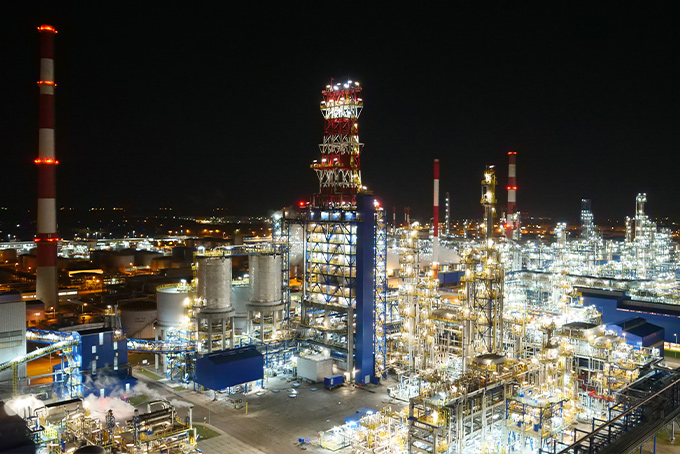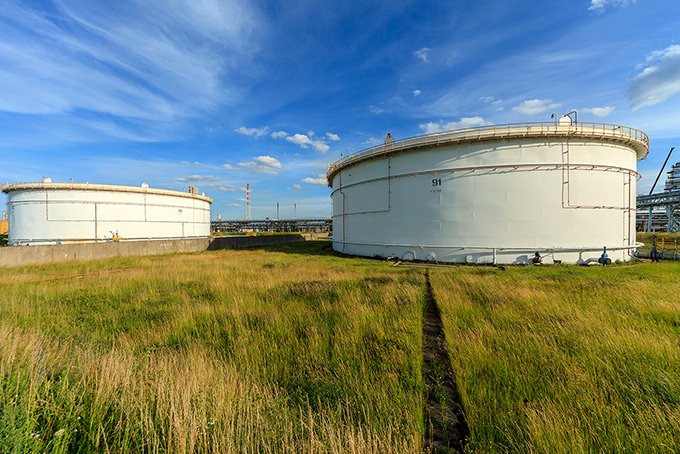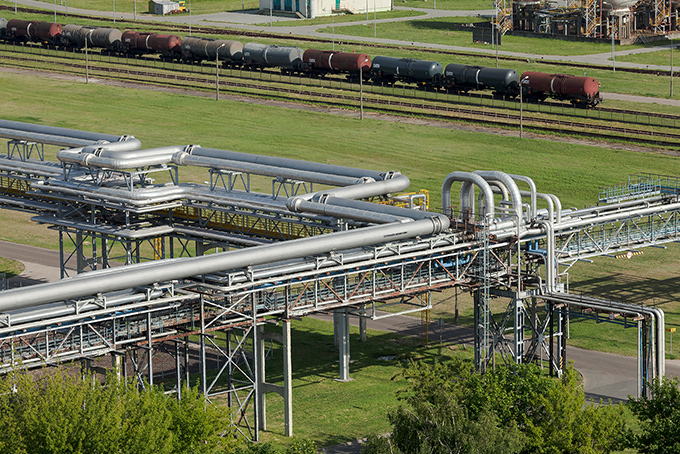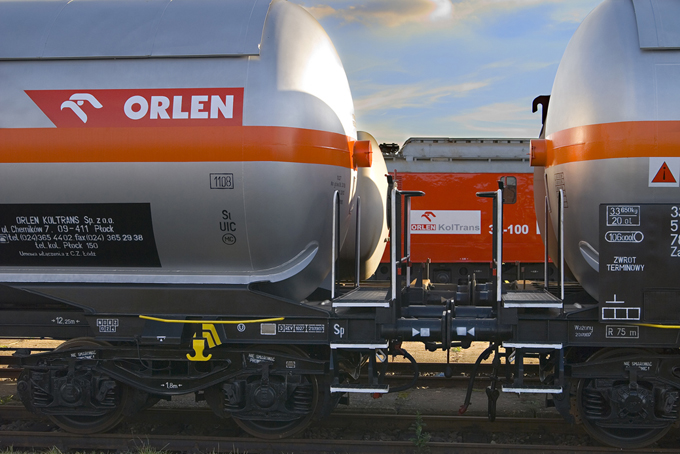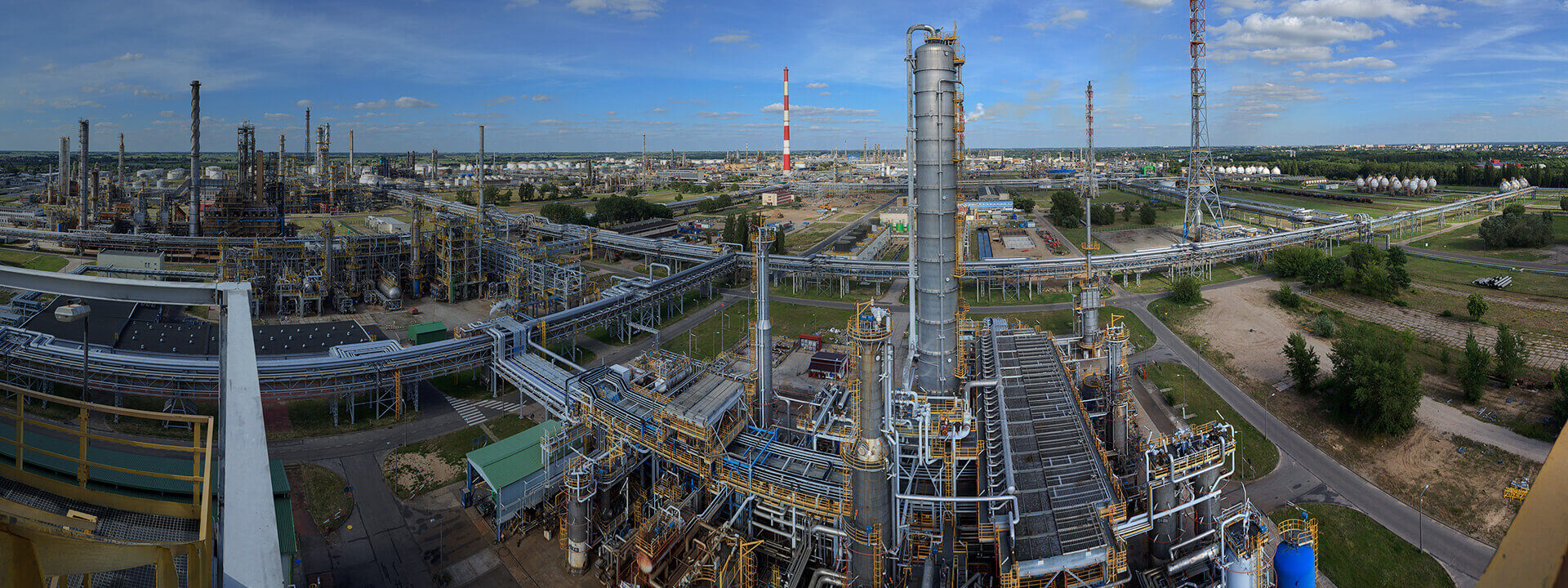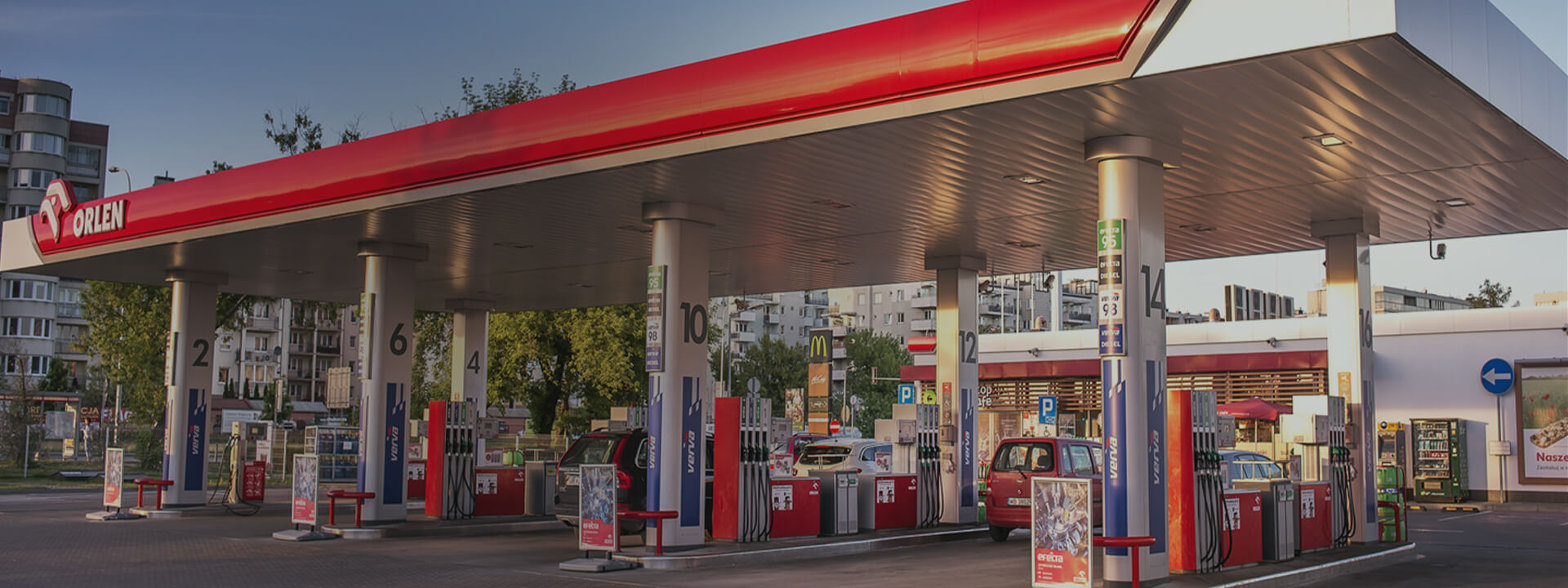Refining
Market trends
In 2022, there was a noticeable trend of refineries worldwide rebuilding capacity utilisation, driven by favourable price conditions (high crack spreads on products). In this context, many plants expanded their capacities to address the product shortfall that occurred after the decrease in supplies from Russia, even though sanctions on imports from Russia entered into force in 2023. Refineries’ operations in recent years were mainly driven by three key variables. First, the COVID-19 pandemic led to a temporary decline in fuel demand, Affecting the refineries’ ability to place their products on the market, and depressing the margins. Numerous plants worldwide were closed down, resulting in a total capacity loss of at least 3.8 million bbl/day. Furthermore, a number of investment projects in the Middle East, Asia Pacific, and Africa were not completed as scheduled due to the pandemic. Consequently, the increase in processing capacities for 2022 was relatively low. The second factor was the modification of China's export policy for fuel products. Since 2021, the number of fuel export licences issued to oil companies (mainly for gasoline, diesel oil and aviation fuel) has been falling, limiting the supply of those products on international markets.
Third, Russia’s aggression against Ukraine affected the availability of not only Russian crude, but mostly of products manufactured in this country (Russia was one of the key suppliers of diesel oil to the European market). The sanctions reduced the availability of diesel oil on the market. On the other hand, imports of this product from such regions as the Middle East and Asia Pacific generate additional costs and increase its price on international markets. Against this backdrop, margins capacity utilisation rates kept rising globally throughout 2022.
Since 2012, a number of refineries, with a total capacity of approximately 2 million bbl/day, have been closed down across Europe. There are more than 100 refineries in Europe with different conversion levels, and some of them (taking into account the prevailing market conditions) have low profitability, as a result of which a number of the plants have already been or will be closed down shortly. A visible trend in the current conditions is also the conversion of plants biorefineries. This process may be slowed down by the current high levels of crack margins, but in the long term it is complex refineries that will enjoy the greatest profits, and thus a competitive edge, rather than simple plants capable of adapting quickly to market conditions.
Crude oil processing worldwide (million bbl/day)
Source: In-house analysis based on OPEC data.
Key assets
ORLEN Group refining assets and key competitors in CEE / processing capacities [million tonnes].
Source: In-house analysis.
ORLEN GROUP
The ORLEN Group's total annual throughput capacity is approximately 45 million tonnes, and its main refineries are:
- The refinery in Płock, being one of the most advanced integrated refining facilities in Central and Eastern Europe, with an annual production capacity of 16.3 million tonnes.
- ORLEN's refinery in Gdańsk, owned by ORLEN and Saudi Aramco following the merger with Grupa LOTOS. Its total annual throughput capacity of approximately 10.5 million tonnes is allocated to the two owners based on their percentage shares in the ownership structure. The Gdańsk refinery specialises chiefly in the production of fuels and bitumens.
- Other Polish refineries, operating as the ORLEN Południe Group in Trzebinia and Jedlicze, manufacturing biofuel components, base oils and heating oils, and regenerate spent oils.
- The ORLEN Lietuva refinery in Mažeikiai, with an annual production capacity of 10.2 million tonnes, being the only refinery in the Baltic States (Lithuania, Latvia and Estonia).
- Refineries of the ORLEN Unipetrol Group located in Kralupy and Litvínov, with a combined annual production capacity of 8.7 million tonnes.
Key operational data
Crude throughput and fuel yields.
Source: In-house analysis.
Volume of crude processed by the ORLEN Group in 2022: nearly 37.1 million tonnes, an increase of 24.0% year on year, including:
- Poland: growth of 44.9% year on year, mainly attributable to the consolidation of the former LOTOS Group’s figures since August 2022 and the absence of maintenance shutdowns that had taken place at the hydrocracking, PX/PTA and olefin units in 2021;
- Czech Republic: growth of 4.8% year on year, driven by improved macroeconomic conditions (higher margins) and increased demand for fuels after the COVID-19 pandemic restrictions were lifted;
- Lithuania: growth of 3.6% year on year, due mainly to improved macroeconomic conditions and increased demand for fuels in ORLEN Lietuva’s markets as the COVID-19 restrictions were lifted.
ORLEN Group’s market shares
Wholesale of refining products
In 2022, the ORLEN Group was involved in wholesale distribution of refining products in Poland, Czechia, Germany, Slovakia, Hungary, Austria, Latvia, Lithuania, Estonia, and Ukraine, and in Western Europe, where products were delivered to transhipment terminals by sea. The ORLEN Group’s home markets are Poland, Lithuania Czechia. The ORLEN Group has an extensive portfolio of refining products, including gasolines, diesel oil, aviation fuel, light and heavy heating oil, bitumen, engine oils and a wide range of non-fuel products and intermediates.
Share of Polish fuel market.
Source: In-house analysis.
A 15.0pp increase in the fuel market share, to 64.8%, mainly as a result of increased sales following the acquisition of Grupa LOTOS. Factoring out the effect of the merger, the market shares would be close to those recorded in 2021 or slightly higher (for middle distillates). The ORLEN Group continues to be the main supplier for major foreign fuel companies operating in Poland (BP, Shell, Amic), and from the second half of the year also for Circle K.
Share of the Czech fuel market.
Source: In-house analysis.
In Czechia, the total market share was 58.9%, including 63.0% of the gasoline market and 57.6% of the diesel oil market, which is largely in line with the market shares held in 2019. The ORLEN Group successfully recovered market shares lost as a result of the COVID-19 pandemic, with the principal driver of this process being the significant growth of demand after the outbreak of the war Ukraine. With limited supply on the market due to the shortage of products in the region and logistical constraints, the ORLEN Group managed to acquire a number of new customers and to win back some former customers.
Share of the Baltic States' fuel market.
Source: In-house analysis.
In 2022, the ORLEN Group consolidated its dominant position in each of the three Baltic states by expanding its market share by approximately 10.7pp year on year, to 83.7%. The combined fuel market shares in Lithuania, Latvia and Estonia rose by 8.9pp, 10.1pp and 15.7pp., respectively as demand recovered after the COVID-19 restrictions were lifted. In addition, starting from the third quarter of 2022, there was an increase in spot purchases from customers re-exporting fuels to Ukraine.
Sales volume
In 2022, the ORLEN Group’s sales in the Refining segment totalled 30,458 thousand tonnes, up by 24.9% on 2021.
Sales of the ORLEN Group Refining segment [PLNm/thousand tonnes].
Revenue structure of the ORLEN Group Refining segment.
No leading customers accounting individually for more than 10% of the Group’s total revenue were identified in 2022, 2021 and 2020.
Sales markets and market shares
Sales volumes in home markets5 of the ORLEN Group Refining segment [thousand tonnes].
Polish market
In 2022, the COVID-19 pandemic gradually shifted to an endemic phase. From Q2 2022, there was a considerable decline in the number of cases and deaths in Poland. The phased removal of pandemic-related restrictions had a positive impact on mobility and economic recovery, improving fuel sales. However, Russia’s attack on Ukraine and the resulting sanctions imposed on the aggressor caused a significant market volatility and pushed up fuel prices to historical highs. The new situation required all market participants to make adjustments to the supply chain. Imports of Russian and Belarusian products decreased (by approximately 50% in the case of diesel oil imported from those countries), while exports to Ukraine went up (some 950 thousand tonnes of diesel oil). In August 2022, in response to the rapidly changing market conditions and as part of the effort to develop its trading capabilities, the ORLEN Group established ORLEN Trading Switzerland GmbH.
In 2022, the consumption of all fuels grew by 2% year on year, particularly in the case of gasolines (up by 14% y/y in H1 2022 and 7% y/y in the whole of 2022). This growth was mainly attributable to the low base and the refugee crisis of 2021. In the first months of 2021, gasoline consumption fell considerably due to COVID-19 (remote work, restrictions on movement), whereas in 2022 the pandemic situation appeared to be under control, which was particularly visible in the second quarter. A large part of the population had been vaccinated and the new Omikron variant proved to be less lethal than previous mutations of the coronavirus. Another important driver of gasoline consumption was the sudden inflow of refugees from Ukraine following Russia's aggression in February 2022.
In the case of diesel oil, consumption grew by approximately 1% year on year and, as in the case of gasoline, the highest growth rate was seen in the first months of the year. Over the next quarters, it gradually slowed down, in line with the fall in the GDP growth.
The consumption of light fuel oil went down by 4% year on year, driven by both warmer winter and a marked increase in prices, which limited demand and contributed to greater interest in alternative sources of heating.
The largest increase in consumption was seen in aviation fuels, up by 62% year on year, mainly due to the gradual abolition of travel restrictions in Europe and most other countries in the world. However, it is still lower than before the pandemic, despite periodic hikes during the holiday and Christmas periods.
Sales volumes of the ORLEN Group Refining segment in Poland [thousand tonnes].
Sales structure of the ORLEN Group Refining segment in Poland.
In 2022, domestic sales of the ORLEN Group’s Refining segment reached 18,101 thousand tonnes, up 5,256 thousand tonnes year year. Mainly attributable to the merger with Grupa LOTOS in August 2022.
Sales of light distillates in the Refining segment grew by 29.8% year on year as a result of higher sales of gasolines (up by 25% y/y) and LPG (up by 55% y/r), driven by, among other things, lower incidence of COVID-19 and the abolition of most of the restrictions that had been in force in previous years. In the case of middle distillates, sales rose by 57% year on year. In terms of volumes, the largest sales were reported for diesel oil, but the highest growth was seen in aviation fuels: their sales volumes nearly doubled, having increased 93%. Sales of light fuel oil improved by approximately 43% year on year.
Sales of heavy fractions grew by some 41% year on year, to 2,384 thousand tonnes. The sales were chiefly correlated the available production capacity. In 2022, there was a positive change in the sales structure of heavy fractions, with an increase in the share of higher-margin oils and a contraction of the share of bitumens. In terms of volumes, a 50% and 30% year-on-year increase was recorded for bitumens and heavy fuel oils, respectively, while the sales volume of other oils grew by 83%.
The Baltic States and Ukraine
The Baltic markets were the least affected by the COVID-19 crisis, which resulted in a quicker recovery in gasoline and diesel consumption to pre-pandemic levels in 2021. In 2022, consumption of gasoline rose by 8% and of aviation fuel by some 68% year on year in the markets served by ORLEN Lietuva. Diesel oil consumption remained largely unchanged year on year.
Despite a major improvement in key macroeconomic indicators in 2021 and the maintenance of a positive GDP in the Baltic states’ markets, in 2022 consumption growth slowed down. This was primarily due to high, double- digit inflation rates in each of those markets.
Sales volumes of the ORLEN Group Refining segment in markets served by ORLEN Lietuva [thousand tonnes].
Sales structure of the ORLEN Group Refining segment in markets served by ORLEN Lietuva.
Despite the challenging macroeconomic environment and the need to adapt to significant market changes caused by the Russian conflict, the ORLEN Group maintained its leading position on all three Baltic markets. In 2022, ORLEN Lietuva reported a year-on-year increase of 1.8% in sales of refining products, to 7,676 thousand tonnes. Higher sales were also achieved in Ukraine, which is an important market for the company. The best sales results were seen in the case of middle distillates: growth of 1.8% year on year, driven mainly by higher consumption of diesel oil in the agricultural and transport sectors. Sales of light fuel oil and aviation fuel went up by 78.9% and 8.3%, respectively, year on year. This increase was partly offset by a year-on-year drop in sales of light distillates (3.9%) and heavy fractions (3.1%).
In 2022, sales to the Ukrainian market had to be adjusted to the new situation resulting from the start of the war and an embargo on transit of goods by rail through Belarus. Despite the challenging business environment, the ORLEN Group continued to sell its products to Ukraine, both from Lithuania and Poland. From the outset, its offering attracted significant interest from Ukrainian customers. ORLEN Lietuva gradually increased supplies and in December 2022 the sales volume reached a level comparable that seen before the conflict. Ukraine remains not only a balancing market, but also an important diversification option. Therefore, in 2023 the ORLEN Group will continue to focus its efforts on fuel sales to Ukrainian customers.
As in previous years, in 2022 ORLEN Lietuva actively participated in balancing ORLEN deficits in the Polish market, supplying significant volumes of diesel oil delivered by land (via the Mockava transhipment terminal purchased in 2021) and by sea.
Czech and Slovak markets
In Czechia, the gasoline market continued to recover after the COVID-19 pandemic. In 2022, consumption grew by approximately 6% year on year and was slowly approaching 2019 levels. The diesel oil market returned to pre-pandemic levels in 2021, and at year-end 2022 saw an increase in consumption of approximately 1%. The air transport market has been affected the most by the pandemic and will need a few years to recover.
Despite a forecast increase of approximately 63% year on year, consumption remained well below the 2019 levels in 2022.
In 2022, the Czech economy showed growth, albeit at a lower rate than in 2021. In addition, as other European economies, it was strongly affected by rising inflation. The macroeconomic climate and market conditions (GDP and consumption levels) had a material effect on the ORLEN Group’s sales performance in Czechia. For details, see sections Macroeconomic environment.
Sales volumes of the ORLEN Group Refining segment in the Czech market [thousand tonnes].
Sales structure of the ORLEN Group Refining segment in Czechia.
Despite the difficult macroeconomic environment, the ORLEN Group reported robust performance in terms of sales, which increased by 16.8% year on year. The highest growth was recorded in middle distillates, with the sales volumes up by 20.0% year on year, driven primarily by higher sales of diesel oil (up by 18.2% y/y) and aviation fuel (up by 153.8% y/y). Sales of light distillates rose by 12.8% year on year, mainly on higher volumes of gasoline (up by 12.6% y/y). At the same time, sales of heavy fractions grew by 17.9% year on year, which was chiefly attributable to a 25% year-on-year increase in sales of bitumens.
In 2022, the ORLEN Group operated on the Czech market through ORLEN Unipetrol, selling its products to a wide range of customers, including large fuel companies and hypermarkets. It also continued A-1 fuel sales at the Prague airport. Apart from sales on the Czech market, ORLEN Unipetrol exported products mainly to the Slovak, German and Hungarian markets. In Hungary, the state authorities' decision to implement maximum wholesale and selling prices contributed to market destabilisation, causing temporary shortages of products, lengthy queues at service stations, substantial financial losses for major market players, and the bankruptcy of smaller operators. The introduction of the price limit had a negative impact on the profitability, and thus on the volume of imports. In view of the deterioration in the fuel market balance, the Hungarian government removed the price caps. Given the above factors, the ORLEN Group decided to significantly reduce its export volumes to Hungary because of lower profitability of sales on that market.
Logistics assets
The logistics infrastructure is one of the key elements of the ORLEN Group's competitive advantage.
The Group operates a network of complementary infrastructure assets: fuel terminals, onshore and offshore handling depots, transmission pipelines, rail transport, and transport by road tankers.
In 2022, pipelines were the primary mode of transport of feedstock and products used by the Group. The total length of product and feedstock pipeline networks, both Group- and third party-owned, used by the ORLEN Group in Poland, Czechia and Lithuania was nearly 3.9 thousand km (including 2.1 thousand km of product pipelines, and 1.8 thousand km of feedstock pipelines). The total length of own and third-party gas pipelines was more than 3.2 thousand km.
In Poland, ORLEN uses 977 km of product pipelines: 620 km of pipelines owned by Przedsiębiorstwo Eksploatacji Rurociągów Naftowych (PERN), as well as its own transport infrastructure with a total length of 357 km, comprising two sections: Płock – Ostrów Wielkopolski – Wrocław (319 km) and two legs of the Wielowieś – Góra pipeline with a total length of 38 km (two sections of 19 km each). Crude oil is transported mainly via the network of pipelines owned by PERN (total length of 887 km), and via the Group’s own pipeline (43 km) connecting Góra and Żółwiniec (link to the PERN pipeline). In 2022, a process was ongoing to contribute four ORLEN’s fuel terminals (in Gdańsk, Gutkowo, Bolesławiec, and Szczecin) to Lotos Terminale. The divestment was part of the merger process with Grupa LOTOS. On December 1st 2022, ORLEN transferred the fuel terminals to Lotos Terminale as a contribution in kind in the form of an organised part of business.
As at the end of 2022, ORLEN’s logistics network included 13 terminals (12 fuel terminals and 1 rail terminal) for the storage and handling of diesel oil and gasolines. Through its subsidiary Lotos Terminale and Lotos Infrastruktura, ORLEN owns further five terminals, in Piotrków Trybunalski, Jasło, Czechowice-Dziedzice, Rypina and Poznań. With respect to LPG assets, ORLEN holds indirectly (through ORLEN Paliwa) five liquified gas storage and handling terminals.
In addition, for the purposes of storing supply security stocks of crude oil and fuels, ORLEN owns the only underground cavern storage facility in Poland (the Góra Underground Crude Oil and Fuels Storage Facility), with a total storage capacity of some 6 mcm, located on IKS Solino’s premises in Góra near Inowrocław.
In 2022, the ORLEN Group used 1,751 km of pipelines in Czechia (1,100 km of product pipelines operated by ĆEPRO, and 651 km of feedstock pipelines operated by MERO), seven storage and distribution depots owned by state-owned operator ČEPRO, three terminals owned by the Group with a total capacity of 293 thousand m3, and 13 terminals owned by ČEPRO with a total capacity of 1,607 thousand m3.
The Mažeikiai refinery is the key asset of Orlen Lietuva. The plant is the second largest ORLEN Group refinery in terms of throughput (10 million tonnes per annum) and the only refinery in the Baltic States. Petroleum products from the Mažeikiai refinery are sold in Lithuania as well as Latvia, Estonia, Poland and other countries. The main component of the logistics infrastructure currently used on the Lithuanian market is a 91-km feedstock pipeline linking the Butinge terminal with the Mazeikiai refinery. Both the terminal and the pipeline are owned by ORLEN Lietuva. In June 2021, ORLEN Lietuva acquired the Mockava rail terminal operating on the Polish- Lithuanian border, with an annual handling capacity of 0.96 million tonnes of diesel oil and 240 thousand tonnes of gasoline, Which is used to handle products manufactured by the Mažeikiai refinery to be supplied to the Polish and Ukrainian markets. The total storage capacity of the terminal is 19.8 thousand m3.
On the German market, ORLEN Deutschland uses the storage and distribution capacities of seven third party-owned depots. Products are delivered mainly by road.
Since November 2022, the ORLEN’s logistics infrastructure has also included two former PGNiG branches.
The Zielona Góra Branch's operations are related to the transport of crude oil and nitrogen-rich gas, Using gas pipelines, other pipelines, rail dispatching centres, oil and gas compressor stations and road tankers. The total length of pipelines operated at the Zielona Góra Branch is approximately 1,774 km (well pipelines and interconnecting pipelines, pipelines transporting natural gas from production sites, pipelines transporting crude oil from production sites to rail dispatching centres and PERN’s ‘Druzhba’ pipeline). Their operation is supported by 25 facilities (crude oil and natural gas extraction facilities, natural gas blending plants, nitrogen rejection unit, dispatching terminals), including three underground gas storage facilities.
The PGNiG Sanok Branch oversees a network of 1,465 km of production site gas pipelines (connecting wells to gas gathering systems and different gas gathering systems) and approximately 152 km of production site oil pipelines (connecting wells to reservoir fluid gathering centres). Their operation is supported by 34 facilities (oil and gas extraction facilities), including four underground gas storage facilities.
Transport and logistics infrastructure used by the ORLEN Group in Europe in 2022.
Supply sources
- 11.21.8
Oil and gas purchased from states
Crude oil
ORLEN supplies crude oil to the Płock refinery and to three other ORLEN Group refineries: in Litvínov and Kralupy in Czechia, and in Lithuania’s Mažeikiai, as well as, since August 2022, to the refinery in Gdańsk. In 2022, some crude oil deliveries by sea were delayed by port closures due to external factors (weather, technical failures). The war in Ukraine did not cause any major disruptions to crude oil supplies to the ORLEN Group companies, Which was possible thanks to a consistently delivered diversification strategy and our successful efforts to find new trading partners. As a result, upon Russian aggression against Ukraine, we were able to quickly minimise our imports of Russian oil.
In 2022, crude oil was purchased in line with the requirements reported by all ORLEN Group refineries, ensuring continuity of supply and processing.
In 2022, long-term contracts were in place with Saudi Arabian Oil Company and ExxonMobil Sales And Supply LLC for the supply of crude oil by sea. Saudi Aramco, the world’s largest oil producer, has become ORLEN’s key partner. In 2022, ORLEN and Saudi Aramco signed a strategic partnership agreement which provides, among other things, for crude supplies sufficient to cover about 45% of the total demand of all refineries across the ORLEN Group.
Furthermore, contracts with AB LOTOS Geonafta, B8 Sp. z o.o. BALTIC S.K. A., Glencore Energy UK Ltd., LOTOS Petrobaltic S.A., and Petraco Oil Company S.A. became effective from August 2022, following the acquisition of Grupa LOTOS.
Supplies of crude by pipelines are secured under contracts with Rosneft Oil Company and Tatneft Europe AG (two contracts as a result of the acquisition of Grupa LOTOS as of August 2022). Russian oil was supplied only under long-term contracts, by pipelines, While other supplies from Russia were replaced by alternative crude types and Arab Light. ORLEN’s contract with Rosneft for the supply of 3.6 million tonnes of crude oil per year expired at the end of January 2023, and Russian crude has been replaced by oil imports from other sources. Consequently, as of February 2023 as much as 90% of the crude processed at ORLEN Group refineries will come non- Russian sources. That being said, the ORLEN Group is fully prepared to operate without Russian oil supplies, so the imposition of any new sanctions on oil imports from Russia would not affect our operations in any way.
Oil supplies by rail are regulated by a contract with Polskie Górnictwo Naftowe i Gazownictwo S.A. (as a result of the acquisition of Grupa LOTOS as of August 2022). The long-term contracts covered almost 75% of crude oil supplies to Poland.
Kazakhstan, Lithuania, Nigeria, Norway, Poland, Russia, the United States and the United Kingdom. The refineries in Czechia received the feedstock from Saudi Arabia, Azerbaijan, Kazakhstan, Libya, Russia and the United States. For the Mažeikiai refinery crude was sourced from Algeria, Saudi Arabia, Kazakhstan, Norway, Russia, the United States and the United Kingdom.
In 2022, the share of Saudi Aramco Company in the crude supplies exceeded 10% of the ORLEN Group’s total revenue.
Natural gas
In 2022, PGNiG/ORLEN purchased natural gas mainly under the long-term agreements and contracts specified below:
- Contract with PAO Gazprom/OOO Gazprom Export, for sale of natural gas to the Republic of Poland, dated September 25th 1996, effective until the end of 2022 (the Yamal contract); On April 27th 2022, deliveries under the contract were discontinued by the supplier;
- Contract with Qatar Liquefied Gas Company Limited (3) for sale of liquefied natural gas, dated June 29th 2009, effective until 2034 (the Qatar contract), and supplementary agreement to the long-term agreement of March 2017 (effective from the beginning of 2018 to 2034);
- Contract with Cheniere Marketing International, LLP for sale of liquefied natural gas, dated November 8th 2018, effective until 2042.
Deliveries were also made under medium- and short-term grid gas and LNG supply contracts (including a five-year contract for nine shipments of liquefied natural gas from Centrica LNG Company Limited, which began to be performed in 2018).
In 2022, the gas imports volume was 152.9 TWh. Gas purchases from countries east of Poland decreased by 1.3 TWh on 2021, While LNG supplies rose from 43.2 TWh in 2021 to 66.6 TWh in 2022.
On May 16th 2022, PGNiG/ORLEN entered into an agreement with Sempra Infrastructure, setting out the key terms of a contract for the purchase of LNG on a Free on Board (FOB) basis. On January 25th 2023, ORLEN signed an agreement with Port Arthur LNG LLC, a company owned by Sempra Infrastructure, for the supply of 1 million tonnes of LNG annually. The contract term is 20 years, and the first deliveries are expected in 2027. LNG will be delivered from the Port Arthur LNG liquefaction terminal in Texas;
For the purpose of transporting the LNG contracted on the basis FOB US terminals, PST, an ORLEN Group company, has chartered a total of eight LNG carriers (six from the Norwegian shipowner Knutsen OAS Shipping and two from Maran Gas Maritime, an Angelicoussis Group company) for a period of ten years. The first of the new vessels, Lech Kaczynski, was transferred to the ORLEN Group in December 2022. The other LNG carriers, with a capacity of approximately 174 thousand m3 each, will be placed in service in 2023–2025. In addition, the ORLEN Group is a party to three short-term charter agreements for existing vessels, two of which, Maran Gas Apollonia and Golar Seal, already deliver LNG to the Świnoujście terminal. The first delivery of LNG by a chartered vessel took place in May 2022. The acquisition of the vessels increases the flexibility of LNG purchases and sales and is another step towards developing the ORLEN Group's trading activities on the global market.
In March 2022, PGNiG/ORLEN submitted an order for regasification services in phase one of the Floating Storage Regasification Unit (FSRU) Open Season procedure carried out by Gaz-System. The purpose of the FSRU Open Season is to gauge the level of market demand for the capacity of the FSRU to be located in Gdańsk Bay by soliciting binding orders for long-term provision of regasification services. FSRU’s planned capacity is approximately 6 bcm per year.
Payments for natural gas supplied under the Yamal Contract and discontinuation of gas supplies by Gazprom
The President of the Russian Federation’s Decree 172 on the special procedure for the fulfilment by foreign buyers of obligations to Russian natural gas suppliers (the ‘Decree’) was published on March 31st 2021. As a result of the Decree, Gazprom served PGNiG/ORLEN with a notice to amend the terms of the Yamal Contract, including by introducing payments in Russian roubles.
On April 12th 2022, the Company decided that PGNiG/ORLEN would continue to fulfil its obligations to pay for natural gas supplied by Gazprom under the Yamal Contract in accordance with its existing terms and conditions, and that an approval for PGNiG/ORLEN fulfil its payment obligations under the Yamal Contract in accordance with the Decree would not be issued.
At 8 am CET on April 27th 2022 Gazprom halted its gas supplies under the Yamal Contract citing the prohibition under the Decree on the supply of natural gas to foreign buyers from countries ‘unfriendly to the Russian Federation’ (including Poland) if payments for natural gas supplied to those countries starting from April 1st 2022 are made in a manner contrary to the provisions of the Decree.
In response, PGNiG/ORLEN took steps to protect the Company’s interests by exercising its contractual rights, including serving a notice to perform and to comply with the payment and other terms of the contract effective until the end of 2022.
As at December 31st 2022, Gazprom did not resume the gas supplies and refused to allow payments in line with the contractual terms in force. According to PGNiG/ORLEN's declaration of will of November 15th 2019, the Yamal Contract expired the end of 2022. The disputes that arose during its term are pending.
LNG supplies
In 2022, PGNiG/ORLEN received a total of 58 LNG shipments, with an aggregate vol-ume of 4.36 million tonnes, i.e. approximately 66.64 TWh of natural gas after regasification, including:
18
deliveries under long-term contracts with Qatargas; the volume of LNG imports from Qatar was 1.65 million tonnes, i.e. approximately 25.21 TWh of natural gas after regasification
35
deliveries under spot contracts
2
deliveries under a medium-term contract with Centrica
3
deliveries under a long-term contract with Cheniere
In 2022, there were no entities whose share in natural gas supplies exceeded 10% of the ORLEN Group's revenues.
Read also:
Short-cuts:
ORLEN Group 2022 Integrated Report
You can also download the report in PDF format

